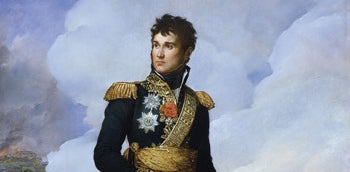Part five of our series on ten of the greatest generals of the Napoleonic Wars looks at Jean Lannes, one of Napoleon's bravest and most daring marshals as well as being a close personal friend.
Jean Lannes (1769-1809), Duke of Montebello, Prince of Siewierz
A brave and daring soldier, Jean Lannes rivals Davout for the title of Napoleon’s most brilliant marshal. Born in 1770 into a family of humble means, he joined the National Guard in 1792 and saw action in the Pyrenees. Transferred to the Army of Italy in 1795, he served under General Bonaparte during the Italian campaign of 1796 and the two men soon became close friends. Lannes particularly distinguished himself at Lodi and Arcole, where he was wounded twice. He was promoted to General of Division during the Egyptian campaign.
During Napoleon's second Italian campaign in 1800, Lannes defeated the Austrian vanguard at the Battle of Montebello on 9 June. At the Battle of Marengo, Lannes held the French right and made a significant contribution to Napoleon's victory, which had been snatched from the jaws of defeat. Like Davout, he was given a command in the Consular Guard following Napoleon’s rise to power. He spared no expense in upgrading the unit's uniform and equipment, which prompted First Consul Bonaparte to order him to pay for the costs out of his own pocket. Unable to do so, he was bailed out by General Augureau. He was then sent to Lisbon to become the ambassador to the Portuguese court, but was not made out for a diplomat. After Napoleon became emperor in 1804, Lannes became a Marshal of the Empire.
During the 1805 campaign, Marshal Lannes played a key role during the Battle of Austerlitz as the commander of the French left wing. While Davout (for bearing the brunt of allied attacks) and Soult (for launching the decisive blow against the enemy centre) received greater recognition, Lannes fought competently and managed to keep Prince Bagration’s men at bay. Unlike the rest of the allied army, Bagration’s men were still in reasonably good shape but were eventually compelled to withdraw from the field after heavy fighting.
Lannes’ greatest campaign was the War of the Fourth Coalition against Prussia and Russia. On 10 October 1806, he defeated the Prince von Hohenlohe’s vanguard at Saalfield with skilful manoeuvring before joining Napoleon at Jena. He won particular distinction at the Battle of Friedland, where Napoleon used his isolated corps to lure General Bennigsen’s Russian army to engage. With 26,000 men at his disposal, he managed to entice Bennigsen to cross the river Alle and held him off for long enough until Napoleon arrived with reinforcements. Outnumbered and with the river behind them, the Russians suffered a decisive defeat which would end the war.
In 1808 Lannes was given an independent command in Spain and brought the siege of Zaragoza to a successful conclusion in February 1809. He was then summoned back to join Napoleon’s campaign against Austria in the War of the Fifth Coalition, where he commanded II Corps. At the Battle of Ratisbon in late April, Lannes demonstrated exemplary bravery by personally leading his men up the walls of the city, who soon overwhelmed the defenders.
During the Battle of Aspern-Essling (21-22 May 1809), Napoleon initially found himself considerably outnumbered. Lannes was tasked with defending the French right at the village of Essling, while Marshal Massena defended held the village of Aspern. On the morning of the second day of the battle, Lannes participated in a major assault against the Austrian centre. Just as the French were on the verge of breaking through, Archduke Charles of Austria personally led a counterattack and reversed the momentum. Lannes was now on the defensive and fought courageously to allow the French to withdraw across the Danube in good order. Near the end of the battle Lannes was hit by an enemy cannonball which shattered his legs and required amputation. After the operation Napoleon came up to him and wept bitterly – the wounds proved to be mortal and Lannes would die on 31 May at the age of 40, leaving the Emperor heartbroken at the loss of a brilliant subordinate and a close companion.
Check out our Marshal Lannes matryoshka mug




Share and get 15% off!
Simply share this product on one of the following social networks and you will unlock 15% off!